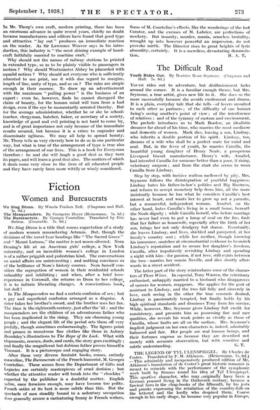The Difficult Road
Youth Rides Out. By Beatrice Kean Seymour. (Chapman and Hall. 7s. 6d.)
Yours rides out to adventure, but disillusionment lurks around the corner. It is a familiar enough theme, but Mrs. Seymour, a true artist, gives new life to it. She does so the more successfully because she avoids excitement and drama. It is a plain, everyday tale that she tells—of lovers unsuited to each other as partners ; of the difficulty of one human being's seeing another's point of view ; of the interference of relatives ; and of the tyranny of custom and environment. The prelude introduces us to Mark Borden, an idealistic dreamer far ahead of his time, who marries the most mediocre and domestic of women. Mark dies, leaving a son, Lindsay, who inherits a double portion of his spirit. Lindsay, too, dreams of a wife who shall be a perfect mate for mind and soul. But, in the fever of youth, he marries Camilla, the beautiful young daughter of Henry Neale, a prosperous Liverpool biscuit manufacturer. Henry's wife, Amabel, had intended Camilla for someone better than a poor, if rising, veterinary surgeon ; and from the start she seems to wean Camilla from Lindsay.
Step by step, with incisive realism mellowed by pity, Mrs. Seymour follows the disintegration of youthful happiness. Lindsay hates his father-in-law's politics and Big Business, and refuses to accept monetary help from him, all the more insistently because he has what he considers Camilla's best interest at heart, and wants her to grow up not a parasite, but a resourceful, independent woman. Amabel, on the other hand, hates Camilla's living in a small home, beneath the Neale dignity ; while Camilla herself, who before marriage has never had even to put a lump of coal on the fire, finds that her failure as housewife, especially after the birth of her son, brings her not only drudgery but shame. Eventually, she leaves Lindsay, and lives, shielded and pampered, at her family's country seat ; while her mother, though knowing his innocence, snatches'at circumstantial evidence to besmirch Lindsay's reputation and to secure her daughter's freedom. Camilla, after impulsively revisiting Lindsay and spending a night with him—for passion, if not love, still exists between the two—marries her cousin Neville, and dies shortly after- wards in a street accident.
The latter part of the story reintroduces some of the charm. ters of Three Wives. In especial, Tony Warren, the veterinary enthusiast, unhappily married to a husband who disapproves of careers for women, reappears. She applies for the post of assistant to tindsay, and the two fall fully and sincerely in love, each seeing in the other the true comrade desired. Lindsay is passionately tempted, but finally holds by his high spiritual standards and dismisses Tony from his service. While, however, Mrs. Seymour gives Lindsay full credit for consistency, and presents him as possessing fine and rare qualities, she reveals his weak points as vividly as those of Camilla, whose faults are all on the surface. Mrs. Seymour's implicit judgment on her own characters is, indeed, admirably balanced and fair. Her people are real human beings, and their fortunes engross us because they are described not merely with accurate observation, but with sensitive and






























 Previous page
Previous page